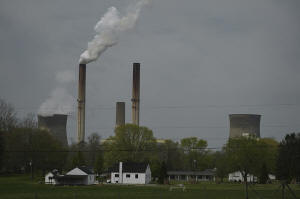National Academy of Sciences rebuffs Trump EPA's effort to undo
regulations fighting climate change
[September 18, 2025]
By MICHAEL PHILLIS and SETH BORENSTEIN
WASHINGTON (AP) — Evidence that climate change harms public health is
“beyond scientific dispute,” the independent National Academy of
Sciences said Wednesday in response to the Trump administration's
efforts to revoke a landmark U.S. government finding to that effect that
underpins key environmental regulations.
The NAS, a non-governmental nonprofit set up to advise the government on
science, said human activity is releasing greenhouse gases that are
warming the planet, increasing extreme temperatures and changing the
oceans, all dangerous developments for the health and welfare of the
United States public. Evidence to that effect has only grown stronger
since 2009, the group said.
In July, the Trump administration proposed revoking what's known as the
2009 “endangerment” finding, the concept that climate change is a
threat. Overturning it could pave the way for cutting a range of rules
that limit pollution from cars, power plants and other sources.
“EPA’s 2009 finding that the human-caused emissions of greenhouse gases
threaten human health and welfare was accurate, has stood the test of
time, and is now reinforced by even stronger evidence,” the NAS said.
Science that was uncertain or tentative in 2009 has now been resolved,
it said, and new risks have been found, too.
The NAS was established in 1863 under President Abraham Lincoln and has
played a significant public role in scientific policy for more than a
century, including consulting on the Clean Air Act.

“The importance of getting the science right weighed heavily on the
committee’s deliberations, given the potential significant implications
of a changing climate and of the actions proposed to address it,” NAS
committee chair and former Princeton University President Shirley
Tilghman wrote in the preface to Wednesday's report.
“Unlike earthquakes and volcanoes, over which we have no control,
responding to the potential harm to human health and welfare from
changes in the climate is actionable now,” Tilghman wrote.
The Trump administration looks to undo more than a decade of
regulations
Under President Donald Trump, the Department of Energy has suggested
that climate models used by scientists to predict warming have
overreached, that long-term trends for disasters generally don’t show
much change and that climate has little impact on the economy. The DOE
also said there are advantages to a world with more carbon, like
increased plant growth.
On Wednesday, the National Academy had a series of scientists explain
their findings in a webcast.
Addressing the administration's assertion that U.S. wildfires aren't
more common recently than they were in the 1980s, the NAS provided
evidence that climate change has worsened them. Earlier springs; longer,
dry summers; and cumulative drought have lengthened the fire window and
raised the probability of large, fast-spreading fires, especially in the
West, the NAS report said.
And while Trump's Department of Energy attributes rising sea levels in
part to sinking land and other factors, it relied on only a few tidal
stations to inform its analysis, said NAS co-author Charles Driscoll, a
Syracuse engineering professor.
Data from all the stations, plus from satellites, shows “very, very
strong” evidence that the rise in sea levels is accelerating, Driscoll
said.

[to top of second column]
|

A home sits near the Gen. James Gavin Power Plant, a coal-fired
power plant, April 14, 2025, in Point Pleasant, W.Va. (AP
Photo/Joshua A. Bickel, File)
 In a statement, EPA said the
endangerment finding was used by the Obama and Biden administrations
to justify “trillions of dollars of greenhouse gas regulations” and
that many of the “extremely pessimistic predictions and assumptions
EPA relied upon have not materialized as expected.”
The Trump administration's work has already been met by strong
pushback from the scientific community, including dozens of experts
who responded to a survey from The Associated Press. The vast
majority of respondents were highly critical of science the
administration put forward as it argued to revoke the endangerment
finding. Many described it as filled with errors, bias and
distortion.
Paul Higgins, an associate executive director of the American
Meteorological Society, said the NAS's work is trustworthy in part
because of the rigorous scientific process it uses.
“The National Academy of Sciences is the premier scientific
organization in the United States,” said Paulina Jaramillo, a
Carnegie Mellon University professor of engineering and public
policy. “In contrast, the DOE report was authored by five scientists
known to be climate skeptics."
A battle with mainstream science
Other mainstream groups have also criticized the administration’s
work. A group of 85 climate experts found it “full of errors, and
not fit to inform policy making.” Environmental groups are already
challenging the administration’s documents in court.
A White House spokesperson previously told The Associated Press that
the Trump administration “is producing Gold Standard Science
research driven by verifiable data” and that the endangerment
finding had long been misused to justify expensive regulations “that
have jeopardized our economic and national security.”
The Trump administration maintains that while climate change is
real, its future effects are unclear and likely weaker than
projected by many mainstream scientists. The administration also
contends that U.S. cuts in greenhouse gas emissions, which largely
come from burning fuels like oil and coal, would mean little
globally.

The authors of the Department of Energy report said in August that
any errors found in the work would be corrected and that the report
is not meant to be a comprehensive review of climate science. They
said the report was intended to focus on topics that have been
“underreported or overlooked in media and political discussions.”
The National Academy of Sciences said in its report released
Wednesday that harm to Americans from climate change is real. People
are exposed to more extreme heat, air pollution and extreme weather
events, just to name a sampling of the threats, NAS said. And it
said the science of climate change reveals the potential for a
frightening future.
“The United States faces a future in which climate-induced harm
continues to worsen and today's extremes become tomorrow's norms,”
the NAS said.
___
Associated Press writer Matthew Daly contributed.
All contents © copyright 2025 Associated Press. All rights reserved |